|
I have been interested
in the talk-radio phenomenon for some time. Both the motivations
of the callers and the personalities of the talk-show hosts
intrigue me. Many months ago, I came across Don Wade and Roma
while surfing the AM stations. They host an early morning program
on WLS-AM 890 from 5 to 9am, bringing divergent views on nearly
every subject to the airwaves. The pair, however, blend their
differences into an enjoyable program. I wrote to Roma requesting
an interview and found her very accommodating. When I could keep
her in "interview mode," I discovered an intensely
engaging and thoughtful person. But this vivacious personality
repeatedly turned the tables on me, wanting to know how I felt
about a particular issue.
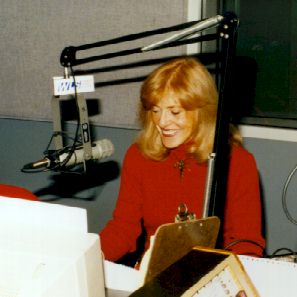 Al: Tell me how you got into radio.
Al: Tell me how you got into radio.
Roma: Actually, I was temporarily producing Don's
show. Occasionally, you could hear my voice off-mic. So John
Gehron suggested that Don use me on his show. So, I came by radio
by accident and very reluctantly. Serendipity again! Radio is not
my calling, and I never even thought that I would be interested
in it.
Al: I read WLS's home page
on the Internet, and it mentioned that you started out as a
teacher.
Roma:That's right. I taught English literature and
creative writing at a university, a community college, high
school and elementary school, plus gifted kids in an elementary
school in Puget Sound. However, high school teaching is the best.
Those kids were so needy. They just wanted some attention. They
desperately wanted to find someone who cared about them and would
congregate at my desk before and after school. I especially like
teaching writing. Why do people want to write?
Al: I think those in the
arts: writers, painters, singers--try to put meaning into their
own personal madness. At least for me, I can look at my writing
over the past decade and see by the number of articles that I
have written whether I was happy or depressed. The greater the
depression--the greater the number of writings. Writing for me is
my attempt to put perimeters on chaos.
Roma: That's exactly my theory. My favorite writing
students were the most troubled; they were the ones that could
write most tellingly. I've always wanted to be a writer, but I
think that I've been too damn happy so far in life.
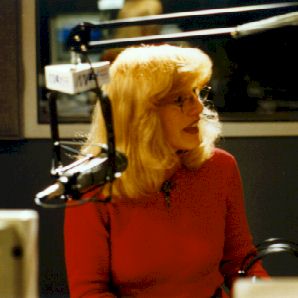 Al: How did you make the shift from teaching to radio?
Al: How did you make the shift from teaching to radio?
Roma: I did a lot of things in between--like weaving
shrimp pots for Alaskan fishermen, waiting tables and remodeling
houses. More serendipity!
Al: I also read of your
varied background and many interests. What is it that makes Roma
run?
Roma: What do you mean? Getting up at midnight to
start my day?
Al: Yes, but also the
emotional energy necessary to do all that you do.
Roma: Life is an adventure, an endless adventure. I
saw something in my mother who happens to be ninety-years old.
She is a brilliant, vivacious university mathematics professor
and Baptist pastor's wife. On our on vacation this past year on
Cape Cod, I came into her bedroom one morning, and she was
sitting on the side of the bed kicking her feet with excitement.
She gets up every day happy and discovers delight in everyday
things. I watched her there and thought, "Boy that's where I
get it." I get up every morning thrilled by the
possibilities that the new day might offer up. So far in this
lifetime, I have been blessed with so many serendipitous
experiences. Everyday is an adventure.
This past Christmas, my
mother visited me. I was writing thank-you notes at sunrise one
morning back in the corner of my living room. As my mother came
into the room, she was just fascinated by the way the light
played with each little crystal piece that hang in the window.
She had no idea that I was there watching as she went from one
sparkling piece to the next, like a little kid. Can you imagine
at ninety jumping out of bed and enjoying the beauty of reflected
light? I thank God for giving me those kinds of genes.
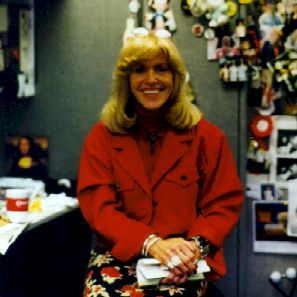 Al: I heard Gene Siskel say that when he interviews someone, he asks
what that person's favorite movie is. He thinks that he can get
to know the person better because the movie answer may give a
more accurate picture of the person than a direct question. So,
what is your favorite movie?
Al: I heard Gene Siskel say that when he interviews someone, he asks
what that person's favorite movie is. He thinks that he can get
to know the person better because the movie answer may give a
more accurate picture of the person than a direct question. So,
what is your favorite movie?
Roma: That's a hard question--I have so many. I don't
think I have just one favorite.
Al: What is your favorite book?
Roma: Now, that's an easy question. The
Red Book, which began as a blank book that I
pasted things in or write my own thoughts. The book has become
file-cabinets of ideas. We are inspired by so many people along
life's way.
Al: What about a favorite quotation?
Roma: There is one framed on my office called The
Stations by Robert
Hastings. I've used in The Red Book year
after year because the message is so important. We shouldn't be
looking for the destination--graduation, marriage, promotion, a
Mercedes--because the final destination ultimately is death.
Instead, savor all the things that we encounter along the way.
Life is always offering up opportunities if we live it in the
present, moment by moment. Serendipity should always be our guide
in life or we will find ourselves on our death bed with a list of
regrets.
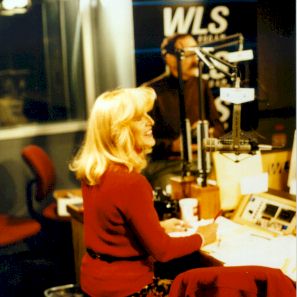 Al: Tell me about the production of your show. When does most of the research
and work get done?
Al: Tell me about the production of your show. When does most of the research
and work get done?
Roma: Most of the research is done in the morning of
the show, because nearly everything breaks during the night. I
have three different armoires filled with TVs, VCRs, and dubbing
equipment. The machines are all programmed to record while I'm
asleep. I record things like Nightline and the late night comics.
This allows me to fast-forward through life. My day starts at
midnight. By 12:15am, with one espresso in me, I am watching all
the various things that have been recorded. In the meantime, Don
is doing the same thing. By 2:00am, our producer wakes up and
starts going through the Internet. At 2:40am I get a shower and
dress, so I can get to the bus stop at 2:59. The bus arrives
about 3:03. Now, I don't have my face on when I get on the bus. I
put my face on while on the ride to the studio. It is always
interesting and funny because you are with late-night revelers,
winos, and homeless people who watch me get fixed up. The bus
driver and the other riders give me all sorts of ideas. I love
interacting with all the characters that ride the bus early in
the morning. On holidays, I often bring them gifts, Christmas
cookies, or candies. Riding a bus is such a joy, I haven't owned
a car for nearly ten years. Without a car, you really stay in
touch with the city.
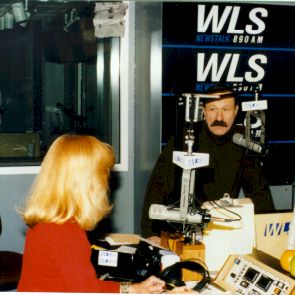 Al: How long do you have to get your face on, interact with the
riders, and get to the studio?
Al: How long do you have to get your face on, interact with the
riders, and get to the studio?
Roma: I get down here by 3:15 or 3:20 at the
latest--about fifteen minutes.
Al: Then what do you do?
Roma: Don and I read six newspapers every morning in
preparation for the show. These are all hands on papers where we
actually cut, clip, mark, and then copy. Then the
technical-support person dubs all the things that we recorded
several hours before. Our producer searches for the latest
editorials and news items off the Internet.
It's crazy around here.
By 4:00am it's really cranking. Then we line up the program. I'm
the choreographer, setting up the chronology for issues. We try
to do hard, soft, hard, soft, alternating the half-hour segments
so that when we have something serious, the next piece tends to
be light or funny. We try to give the items a balance. The show
is heavily news oriented so we try to give our listeners a handle
to look at news events and a sense of humor to enjoy them.
Al: Was there a conscious
attempt to balance you and Don? He holds very strong
beliefs--especially when it comes to politics. You seem much more
to the middle of the road. He tends toward the strident, and you
are more nurturing. Was this intentional?
Roma: No, not at all. I really didn't know very much
about his political views. We were together originally not on
talk-radio but as partners on a rock-n-roil program. Off the air,
Don is extremely quiet. At a party, you wouldn't know when he
left because he does leave. Off the air, I'm the loquacious one,
but I'm just the opposite on the air. Don looks at things as cut
and dried, black and white, right and wrong; I tend to see both
sides of the issue. It is just our natures, and it is a good
balance for the show.
Al: How did you and Don
evolve from disc jockeys to talk-radio hosts?
Roma: Well, we did more playing around on the air than
we did playing records. It was then that the readings from The
Red Book started. Don entertained listeners
with his imaginary characters: Peter Suckwell, General Nuisance
and his aide, Private Parts, Mother Goose Grease, and Sheriff C.
W. Turnipseedall of whom lived in his head. Neither one of us
knew that we could do talk-radio. We just evolved into it. Then
the station format followed our lead.
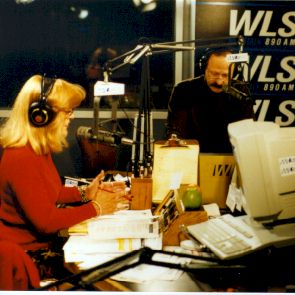 Al: One
further question about the Don Wade and Roma Show: how do you
handle all the conflict and strongly held opinions of the
listeners or Don? You put yourself on the line for
hours--everyday. Doesn't the buffeting of opposing opinions wear
on you?
Al: One
further question about the Don Wade and Roma Show: how do you
handle all the conflict and strongly held opinions of the
listeners or Don? You put yourself on the line for
hours--everyday. Doesn't the buffeting of opposing opinions wear
on you?
Roma: Not ordinarily. People give you things all the
time, but you don't have to accept their gifts--their opinions.
You can ponder their opinions, but you don't have to accept or
defend anything. It is only if you attach your ego to that
opposing opinion. If you are just hearing it, you aren't
obligated to accept it.
Al: You can blow off someone
who gets really very angry with you without it leaving any
residual gunk with you after they hang up?
Roma: Our producers marvel at this ability. They say
my emotions rarely get hooked. However, if the listener gets in
there and snags my ego, then I respond by verbally grabbing them
by the collar and telling them what I think. That always
surprises people because it rarely happens. If my ego doesn't get
hooked, then differing opinions don't bother me at all. Does that
make any sense?
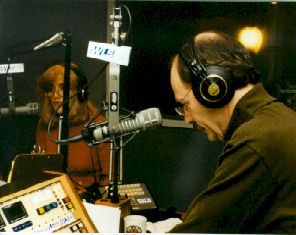 Al: I understand what you
are saying about getting your ego enmeshed in a listener's issue.
However, what about differing opinions between you and Don? How
do you handle an off-the-air relationship with someone with whom
you often differ on the air? And you seem to be able to handle
disagreement everyday for hours. Isn't that emotionally tiring? I
can see how you can blow-off some opinionated listener. But how
do you deal with the divergent opinions of someone close to you?
Al: I understand what you
are saying about getting your ego enmeshed in a listener's issue.
However, what about differing opinions between you and Don? How
do you handle an off-the-air relationship with someone with whom
you often differ on the air? And you seem to be able to handle
disagreement everyday for hours. Isn't that emotionally tiring? I
can see how you can blow-off some opinionated listener. But how
do you deal with the divergent opinions of someone close to you?
Roma:
That's a good question. It has to do with the values and balance
that each of us provides for the other. Maybe, it is because of
the wonderful role models that my parents were. My father was a
real dynamo and a Baptist preacher. He was really strong, really
opinionated, and a really good person. My mother was brilliant
and sensitive, and she adored my father. It only hit the fan when
he would cross over into her territory, and it did on
occasion--but not often. They both respected each other. He
worshipped the ground that she walked on. She is brilliant and
beautiful, and he didn't know why she married him. She felt the
same way about him. You need the other person to form a whole.
The Bible is right--you become one. They were completely separate
entities, yet they formed a whole. They could be who they were
because of the other person. It gives you the freedom to be who
you are. They were a great team.
In the same way, being
with Don gives me the freedom to be me. When I first met Don, I
didn't know that he was a political conservative. I used to march
and protest. "Peace." "No more war." When I
first met Don, he had a long ponytail. I didn't know anything
about his politics, but I did know that he is a good, good
person.
Al: He seems to get hooked
on political issues.
Roma: I tell him that he is getting to believe this
Republican/Democratic thing too deeply. All this political stuff
is unreal. He is letting something unreal get to him. It's like
time. I don't believe in time either--I don't even wear a watch.
Time is a man-made construct. I don't have a computer either.
Computers are the devil. The Unabomber is right. The computer
will consume you. I don't have enough time in the day. Add a
computer to my day and where would I find the time? I went to bed
last night at 7:34pm and got up at midnight. That's not
enough--four hours and twenty-six minutes of sleep. What time I
have, I want to spend it with my Red Book, thoughts,
friends, family, plus living and loving creatively--making a
difference in the lives I touch.
Al: What is the next stage
of your evolution in personal growth?
Roma: I love carpentry, making furniture, or gutting a
house. I also want to sculpt. I want to build a structure
over-looking Puget Sound. From there, I would like to travel
around the world, teach yoga, and write. I've learned a lot from
talk-radio. It has been like teaching. You have a new lesson plan
everyday. But, I am getting itchy feet. I can feel it coming. I
can feel the momentum building. I love hearing the voice that
swirls around within me. It's like getting a chocolate urge, only
far more significant, more spiritual. It's like waking up in the
middle of the night hearing the voice whispering, "Roma,
Roma, it's time."
Al: You sound like Kostner
in Field of Dreams. Both of you hear the voice.
Kostner in a cornfield and Roma in the canyons of Chicago.
Roma: Right. Life is inspiration. I love exploring unknown
territory.
Al: After you day in the sun
is over and you breathe your last, how do you want to be
remembered?
Roma: Epitaph: Love was her life's mission, and love
never dies.
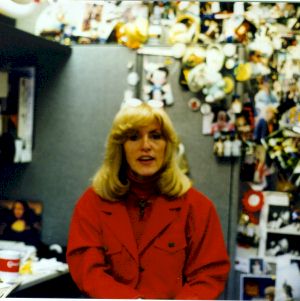 Al: What is death?
Al: What is death?
Roma:
I think that in death my energy is recycled. We come from the
Source--that I am God and you are God. When we really meet, we
see God in each other. All of our flaws and needs are just
distractions and perhaps tools to educate us. God is love; we are
God; so we are love.
Al: So, when you die, you
will go back the Source and start again?
Roma: Right, in whatever form. I don't know what forms
there are in the universe. I don't know whether it will be
corporeal or not. If you watch someone die, the body is just
lying there, but that energy is not in there anymore. That spirit
did not die. The body is merely a cast-off garment. Spirit is.
Al: Henry Ward Beecher, the
great Abolitionist of the last century, said as he died,
"And now comes the mystery." When I die, I think that
who I am is merged into the essence of God. This may sound
Eastern, but I think that theology is also in Christianity.
Roma: You reunite with It, God, the One.
Check out the related
article, AVOIDING THE HOOK.
|







 Al: Tell me how you got into radio.
Al: Tell me how you got into radio. Al: How did you make the shift from teaching to radio?
Al: How did you make the shift from teaching to radio? Al: I heard Gene Siskel say that when he interviews someone, he asks
what that person's favorite movie is. He thinks that he can get
to know the person better because the movie answer may give a
more accurate picture of the person than a direct question. So,
what is your favorite movie?
Al: I heard Gene Siskel say that when he interviews someone, he asks
what that person's favorite movie is. He thinks that he can get
to know the person better because the movie answer may give a
more accurate picture of the person than a direct question. So,
what is your favorite movie? Al: Tell me about the production of your show. When does most of the research
and work get done?
Al: Tell me about the production of your show. When does most of the research
and work get done? Al: How long do you have to get your face on, interact with the
riders, and get to the studio?
Al: How long do you have to get your face on, interact with the
riders, and get to the studio? Al: One
further question about the Don Wade and Roma Show: how do you
handle all the conflict and strongly held opinions of the
listeners or Don? You put yourself on the line for
hours--everyday. Doesn't the buffeting of opposing opinions wear
on you?
Al: One
further question about the Don Wade and Roma Show: how do you
handle all the conflict and strongly held opinions of the
listeners or Don? You put yourself on the line for
hours--everyday. Doesn't the buffeting of opposing opinions wear
on you? Al: I understand what you
are saying about getting your ego enmeshed in a listener's issue.
However, what about differing opinions between you and Don? How
do you handle an off-the-air relationship with someone with whom
you often differ on the air? And you seem to be able to handle
disagreement everyday for hours. Isn't that emotionally tiring? I
can see how you can blow-off some opinionated listener. But how
do you deal with the divergent opinions of someone close to you?
Al: I understand what you
are saying about getting your ego enmeshed in a listener's issue.
However, what about differing opinions between you and Don? How
do you handle an off-the-air relationship with someone with whom
you often differ on the air? And you seem to be able to handle
disagreement everyday for hours. Isn't that emotionally tiring? I
can see how you can blow-off some opinionated listener. But how
do you deal with the divergent opinions of someone close to you? Al: What is death?
Al: What is death?